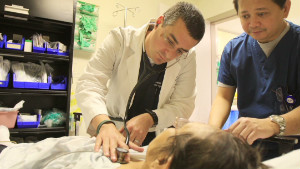 Physician owned distributorships (PODs) have been the source of considerable controversy for years, but now they’ve caught the attention of Congress!
Physician owned distributorships (PODs) have been the source of considerable controversy for years, but now they’ve caught the attention of Congress!
PODs distribute various things, most commonly surgical implants and devices, that are reimbursed by insurers. A patient needs a spinal rod, a surgical implant/device company makes it and a distributor rep distributed it. Device/implant companies usually contract with distributorships to sell their products. Distributorships contract with reps who are paid commissions for sales. Surgeons who actually order the devices sometimes think “Since I’m the one doing the surgery and ordering all this stuff, why don’t I make something from the selling it?” PODs are one way for physicians to financially benefit from the sales of devices and items their patients need, but they have never been more controversial than now.
Conceptually speaking, PODs are controversial because government regulators think physicians who have an economic stake in health care items or services will tend to over utilize them. Moreover, there is a specific concern that allowing physicians to profit from the devices their patients need violates federal anti kickback laws or the Stark prohibition on compensation arrangements.
In 2006, the Office of the Inspector General of HHS and CMS expressed major concerns about PODs, and cited concerns about “improper inducements.” At that time, the OIG stopped short of prohibiting them, but called for heightened scrutiny. CMS itself has stated that PODs “serve little purpose other than providing physicians the opportunity to earn economic benefits in exchange for nothing more than ordering medical devices or other products that the physician-investors use on their own patients.”
Implantable medical devices are unusual in the way they come into use. Unlike DMEPOS, for instance, medical devices are not sold to distributors. They’re sold from the manufacture to the medical facility where the surgery will take place. So, the argument goes, physicians are not actually in a position to drive the sales volume of the implants. The counter: physicians invested in a POD can leverage their hospital admissions to influence the device choice of hospitals and surgery centers.
The biggest legal hurdle for PODs is the federal Anti Kickback Statute, which carries both criminal and civil penalties. Simply put, if even one purpose of an arrangement is to pay for patient referrals, the law is violated. So, the law is arguably violated if one purpose of the POD is to induce physicians to order implants for their patients. Looked at another way, the law is violated if one purpose of a hospital doing business with a POD is to ensure patient referrals by the physician POD investors.
A 1989 OIG Special Fraud Alert on fraudulent physician joint ventures is especially interesting on the fraud and abuse issues in pointing out that the following would indicate unlawful intent to induce patient referrals—
Investor choice. If the only investors chosen are surgeons with an opportunity to refer and if they lack any business or management expertise, the arrangement appears to be a cloaked way to incentivize unlawful referrals (i.e. ordering implants). The key question is whether the business, in selecting investors, is looking to raise capital or to lock in referral sources.
Risk. If the POD investment involves little or no financial risk, the OIG would likely take issue with it.
The bottom line seems to be that if there isn’t a real business, with real financial risk and qualified investors, a POD will likely be viewed as a suspicious arrangement based on locking in patient referrals or physician admitting pressure by physician investors.
In its June, 2011 Inquiry “Physician Owned Distributors (PODs): Overview of Key Issues and Potential Areas for Congressional Oversight,” the U.S. Senate Finance Committee Minority Staff, the Committee reports “A number of legal and ethical concerns have been identified as a result of this initial inquiry into the POD Models.” The Committee reviewed over 1,000 pages of documents and spoke with over 50 people in preparing its report. The Committee cited long-held concerns regarding PODs, and leaned heavily on the 2006 Hogan Lovells (previously Hogan & Hartson) law firm’s anti-POD analysis.
With the Committee’s call for greater OIG and CMS involvement, one thing seems clear: the future of PODs is uncertain. In this era of cost-cutting, it seems clear that PODs are gonna get a haircut and may even lose their head.
 In December, 2012, the OIG reviewed and frowned upon two proposed scenarios, each of which had the effect of shifting to ASC-owner/surgeons a portion of the fees earned from anesthesia services. The OIG has done it again!
In December, 2012, the OIG reviewed and frowned upon two proposed scenarios, each of which had the effect of shifting to ASC-owner/surgeons a portion of the fees earned from anesthesia services. The OIG has done it again!


 CNN Explains: Health care reform
CNN Explains: Health care reform
